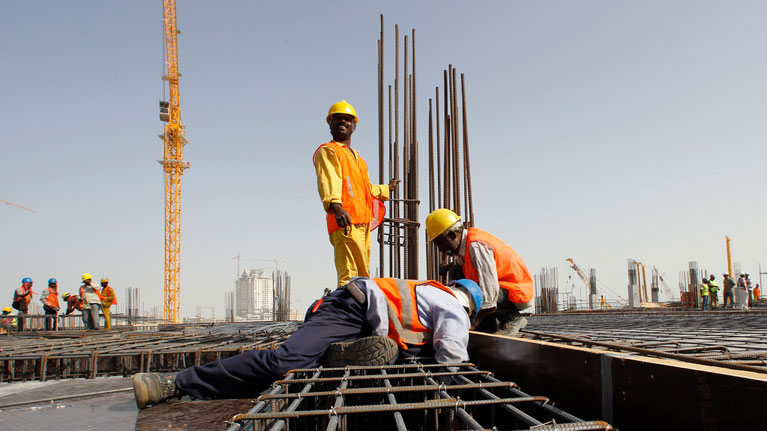Over the past few years, Qatar has seen a number of labour reforms. In 2021, the country introduced the region’s first ever non-discriminatory minimum wage law.
With 100 days until the World Cup kicks off, Human Rights Watch has urged FIFA and Qatar on Friday to enhance compensation for migrant workers and their families, as Doha confirmed it has paid millions over four years.
The rights group demanded a “comprehensive remedy programme for workers who suffered serious harms, including deaths, injuries, and wage theft,” while working on World Cup-related facilities like as stadiums, transportation, and hotels.
Qatar has spent tens of billions of dollars on infrastructure since it was selected as the FIFA World Cup host in 2010, though it has faced intense scrutiny over its labour laws and treatment of hundreds of thousands of workers, many of whom are from South Asia.
In a statement sent to Doha News, a Qatari government official pointed towards the the Workers’ Support and Insurance Fund that was established in 2018 to disburse payments awarded by the Labour Dispute Settlement Committees when a company becomes insolvent and is unable to pay workers.
“By the end of last year, the fund had disbursed close to QAR 600m (€160m) to over 36,000 workers,” the statement read, noting companies in Qatar are legally required to compensate the families of all workers who die in a work-related incident.
“Immediately after a work-related death occurs, the company is required to report the incident through a dedicated electronic system. An investigation is then carried out by the authorities to identify the cause of death and determine whether adequate health and safety measures were in place. If a violation occurred, legal action is taken against the company.
“Once the cause of death is identified as work-related, a final report is submitted to the legal authorities to determine the amount of compensation to be paid by the company to the family. This decision is immediately enforceable under Qatari law, the statement read.,
HRW did not indicate how much compensation is still required, but Amnesty International has requested FIFA pay USD 440 million in reparations to workers — the same amount the football global body will give in prize money to the 32 national federations whose teams are competing in Qatar.
“Qatar has compensated some migrant workers who have faced serious abuses in recent years, but for many, these programs were created too late and are still a major work in progress,” said Michael Page, HRW’s deputy director for the Middle East.
According to the organisation, the number of “uncompensated human rights abuses… is significant” since 2010.
Meanwhile, Qatar’s Ministry of Labor has stated that a Workers’ Support Fund in Qatar has given out $164 million in compensations to 36,373 workers from 17 different countries since 2020.
Amid the ongoing criticism, FIFA, the International Labour Organization and World Cup organisers have long hailed the tournament as a stimulus for modernising Qatari laws and society.
Responding to Amnesty in May, Qatari organisers pointed to “significant improvements … across accommodation standards, health and safety regulations, grievance mechanisms, healthcare provision, and reimbursements of illegal recruitment fees to workers.”
Qatar’s labour reforms
Over the last decade, Qatar has seen a number of historic labour reforms. In 2021, the country introduced the region’s first ever non-discriminatory minimum wage law, triggering praise worldwide.
Additionally, Qatar approved two key laws in August 2020 to eliminate barriers on migrant workers leaving the country and changing jobs without permission from their employers.
This also saw the establishment of a monthly minimum wage of 1,000 QAR, including basic living allowances for select workers.
Under it, employers are now obliged to pay their workers allowances of 300 QAR for food, 500 QAR for housing, and a minimum monthly basic wage of 1,000 QAR.
Employers who fail to comply with the minimum wage law will face a one-year jail sentence and a 10,000 QAR fine.
The Ministry of Labour also launched a new platform for workers’ complaints in May 2021 to enable employees to submit public violations of the labour law.
The new laws have the potential to strike at the core of the Kafala system, which continues to link migrant workers to their employers, if effectively implemented. However, there are numerous cases of employers not abiding by the reforms.
Employees told Amnesty International that changing employment still comes with major obstacles and opposition from dissatisfied bosses.
More than 2,000 labour complaints were filed with the Ministry of Labour against firms and institutions across the country in December.
In recent months, there has been a slew of new complaints about working hours, compensation, and a variety of other issues.
Qatar’s Minister of Labour Ali Al Marri recently stated that the legislative updates and improvements in the labour sector in recent years have been ‘continuous and sustainable’ and will continue after the World Cup.







